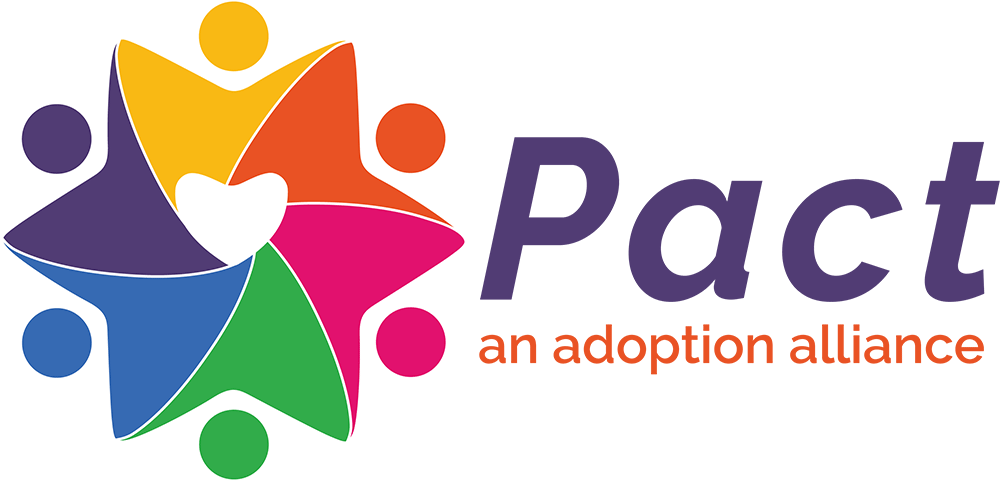Pact’s Adoptive Parents of Color Collaborative raises up the voices and visibility of adoptive parents of color. This month: Meet Antonio Ocampo Guzman.
How do you describe yourself?
I’m a Colombian immigrant, father, husband, and professional.
How do you describe your family?
Our family is very heterogeneous. We are of different races, cultures, and personalities. In this country, I identify as Latino, my husband is white, and our child is Black. We are a very tight family, interact very efficiently, and work well together.
How or why did you choose adoption to build your family?
Early in our relationship, we discussed raising a family, and it was always about adoption, not surrogacy. We struggled to find the best way to create a family. We first tried private adoption, which didn’t work for us ethically or financially. So, we worked with the state to adopt through foster care. It was a bit scary because of the complexity of the foster-to-adopt system and the legal issues related to Max’s adoption. We brought Max home when he was 12 days old, and due to legal delays, we formally adopted Max when he was five.
What is the best part of being a parent through adoption?
I think this question could be, “What is the best part about being a parent?” I examine everything deeply, and I believe some of that comes from being an immigrant and being married to a man of a different race. Max’s adoption is a deeply rooted choice. And with what I’ve learned through Pact and lived experience, many of my choices are more intentional and critical. But the best thing about being a parent is the incredible ride.
What is the biggest challenge of being a parent through adoption?
One of my biggest challenges, and I wish I understood better before Max’s adoption, are the many layers of racism in our society. I recognized overt racism, but the covert layers that exist are less noticeable. I am Colombian and identify as Latino in this country, and I have faced discrimination based on race, xenophobia, and homophobia. However, I realize what I’ve experienced does not prepare me for the anti-Black racism that Max faces in life. The profound responsibility of raising a Black boy, and eventually a man, in the current environment is never far from my mind. Raising him with joy is also never far from my mind.
What advice do you have for families of color just starting the adoption process?
I wish I had a more realistic picture of adoption. I didn’t understand the amount of trauma and ambiguous loss for the child and the first family. Try to understand as much as possible about adoption trauma before beginning the process. Additionally, parents of color need to be aware of the adoption structure through a racial and socio-economic lens and the complications of white privilege that permeate the process. This was a surprise to me in the beginning. This demonstrates why the Adoptive Parents of Color Collaborative (APCC) meetings at Pact Family Camp are so important. Adoptive parents of color must be mindful of the white saviorism, the white guilt, white shame, and white privilege they will encounter in transracial adoption spaces. Pact understands this complex dynamic, so they provide safe spaces for parents of color in their programs and camps. I especially appreciate that some of the APCC camp sessions include keynote speakers so we, as people of color, can dig into the additional nuances of topics that may be left out in the presentation with white and BIPOC parents of color.
How did you first connect with Pact?
My husband’s colleague was familiar with Pact and knew people that had previously attended Pact Family Camp. Later that year, in 2017, Beth Hall, Pact’s Executive Director, came to Boston to talk to local families raising adopted children of color, and we attended her presentation. Following that event, we decided to participate in the first Pact Family Camp East in Reisterstown, Maryland. Another Boston family hosted a get-together for Pact families before Camp, and we met some other Pact families.
Which Pact services do you find most valuable?
Camp is the most valuable for our family and our growth. But we find other services useful as well. In preparation for meeting Max’s first family, we consulted with Beth, who helped us consider the most respectful and intentional way to engage. She also helped us prepare Max for the visit and the beginning of a meaningful relationship with his first family. We also had a post-visit meeting with Beth to unpack the experience. During the pandemic, I watched many of the Pact webinars. I found many of them very useful.
Why is Pact’s Adoptive Parents of Color Collaborative important to you?
It is a beneficial space to digest the dynamic I mentioned above, whether at camp, in the monthly support call, or via the newsletter or blog. There is so much complexity in transracial adoption spaces. Having the community to process these intricacies allows for growth specific to our needs.
Would you like to be profiled and introduce yourself and your experiences to the APCC community? Or would you like to suggest another community member for a future profile? Please let us know at apcc@pactadopt.org.

